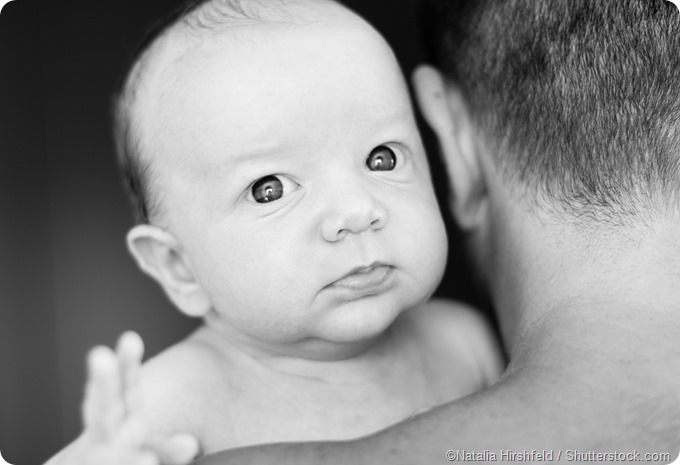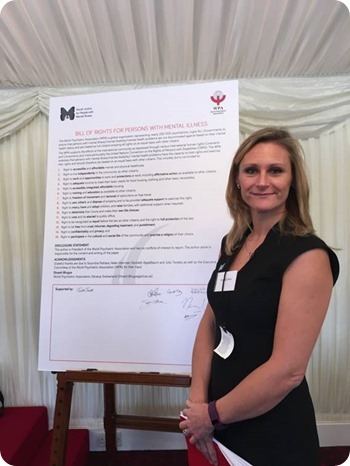Latest research suggests that 1 in 10 dads will suffer from postnatal depression (PND), and as many as 1 in 7 women will be diagnosed. This was from a survey by NCT released in 2015. This also revealed that as many as 38% of new dads have concerns surrounding their mental health.
Interestingly, onset of PND in fathers seems to occur between the 3-6-month period after the birth of their child, whereas mothers can be during pregnancy, immediately post-delivery in the situation of postpartum psychosis and up to 12 months following the delivery. This is the perinatal period.

What are the symptoms of postnatal depression in dads? Are these any different to postnatal depression in mums?
Whilst there are similarities between the men and women, for example difficulty sleeping, over or under eating, physical symptoms such as headaches, women suffering from PND tend to exhibit symptoms such as, persistent low mood, increase in anxiety levels, lack of pleasure on doing things, decrease in levels of self-esteem, and basic inability to summon the energy or enthusiasm for general everyday tasks such as brushing of hair, and decreases in personal hygiene levels.
Evidence suggests that men experience PND differently, exhibiting symptoms such as anger and hostility, and are more likely to engage in activities that enable them to escape reality such as gambling or working more than usual. Of course, every single person, be they male or female, will experience PND differently, and as such, this isn’t an exhaustive list.
How much is known about the causes of postnatal depression?
There is no single answer as to why some fathers are susceptible PND and others are not, however it has been identified that the increase in financial responsibility, changes to the relationship dynamic, and the birth process being a stressful time both emotionally and physically, combined with sleep deprivation all have roles to play surrounding PND.
Fathers are subjected to many of the changes that women are such as emotional and financial strain, fatigue and sleep deprivation.
Fathers that did not have had a role model growing up, having been raised by their mother alone, can feel ill-equipped and inadequate, out of depth.
Historically, PND was considered to be as a result of hormonal changes, and as such, studies focused on the women, however it is now widely recognized that paternal postnatal depression (PPND) is also a result of psychosocial causes.
Are there any risk factors that make you more likely to experience postnatal depression?
Many have been identified, however directly linking to causality is much more difficult. Maternal perinatal mental illness is known to be a significant factor in the father developing PPND, as well as relationship struggles, the pregnancy being unplanned, and a history of mental health issues all predispose or raise the risk of PPND prevalence.
How does postnatal depression affect relationships?
PND within a family unit can have far reaching effects, not just for those that are suffering, but for the wider family as a whole.
Children within the household are affected, extended family and friends might not know what to do or how to help. They might not be supportive or even understand the difficulties within the household.
Stress levels within the household could be elevated, and tensions higher than usual. Patience and tolerance might not exist, and so shouting, crying and all manner of powerful emotions could be on display, sometimes to extreme levels.
This could affect attachment and bonding, not just for the new addition to the family, but also for any existing children within the family unit. Fathers suffering from PND tend to display different behaviors to a woman. There could be less empathy, sensitivity, emotional responsiveness to his partner
What help and support is available for paternal postnatal depression?
Initially, extended family members could help by being aware of the signs and symptoms of PND. It is entirely possible that the sufferer might not even realize that there is anything wrong, in which case it is more likely that someone close will notice that they are acting out of character.
In the first instance, families should always be signposted to their healthcare providers, this can be their midwife, health visitor, GP. If they have a history of mental illness, they could be under the care of a community mental health team, and so contact with them is also recommended.
There are also lots of different organizations and charities that provide support for perinatal mental health illnesses. Mind, PANDAS, NCT, APP, the Samaritans and others are able to provide a wealth of information on their respective websites, as well as ways to be able to access peer support. Some of these organizations offer local support groups and helplines in way of third sector peer support.
What research is being carried out into postnatal depression in dads?
There is much in the pipeline for the dads. It is recognized that there are significant gaps in knowledge and understanding where paternal PND is concerned, and this is starting to gather momentum as we speak. Whilst there is also still much to be done for maternal mental health illness, we must raise levels of understanding of paternal mental health to the same standard.
Where can readers find more information?
PANDAS Foundation has lots of useful information on our website www.pandasfoundation.org.uk and if you are a dad struggling, or are supporting someone who is, we have a group especially for the dads. Details are on our website.

About Donna Collins
Donna has worked with the PANDAS Foundation for 2 years, first as a volunteer providing peer support to vulnerable individuals accessing support for a perinatal mental health illness, later as Volunteer Manager and more recently as Managing Director.
Her immediate priorities for the Charity are to build its reach through greater awareness and the expansion of support groups, while building close relationships with the Charities that form the Maternal Mental Health Alliance, to build on the growing profile of mental health issues within society.
Previously having served with the Royal Air Force and run her own business as a Personal Trainer and Sports Massage therapist, Donna brings an enviable breadth of experience to this latest role. Additionally, Donna has recently completed the first year of her studies at Greenwich University where she is studying midwifery and hopes to specialize in mental health roles.